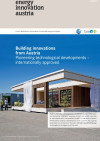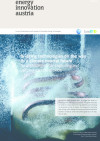Suchergebnisse für "Factsheet: Energietechnologien gestalten, die für alle sinnvoll und nutzbar sind"
StraTex ‐ Sorting and processing strategies for used textiles to produce recyclable fractions
In StraTex, suitable, economically viable and holistic strategies for the collection, processing and automated sorting of mixed non‐reusable textiles are being developed and experimentally implemented in order to increase the proportion of marketable fractions for high‐quality material recycling (preferably fibre2fibre).
Gründerzeit with future - demonstration project 1: David´s Corner
High value energy efficient refurbishment of an ensemble of three neighbouring Wilhelminian style buildings in a non-lucrative location.
CombiSol: solar combisystems for houses, state-of-the-art and potentials for improvements
Evaluation of the quality and efficiency of state-of-the-art installed solar combisystems, potentials for improvements and measures to increase the quality
Supply Chain Forest-Logistic-Saw as First application of platform of IT/Telematics concepts for resource efficient forestry use in montane forest
A Supply Chain Management concept for sustained use of the mountain forest in collaboration with all the individual participants is to be drawn up. Harvesting and transport from the forest to the mill will be registered and controlled by WEB-GIS technology. A CO2 balance sheet will be prepared and optimization potentials shown in the process. An outline will be made of an integrated job model.
Development of modular parts for clay-passive houses

Development of extensive storey-high modular parts made of renewable primary products (wood, straw, hemp) for clay-passive houses.
Vilipa - Visible light based Person and Group Detection in existing buildings
Evaluation of the technical and economic feasibility of an occupancy detection system based on the technology of visible light sensing, which, in combination with the building management system, should reduce the energy consumption of buildings. The goal is to implement low-tech/low-complexity solutions that can distinguish between individuals and groups based solely on the detection of visible light reflections.
Best-of "Building of Tomorrow" 2010
22. and 23. November 2010
Skylounge, Austrian Chamber of Commerce (WKO)
Vienna, AT
In the frame of this conference results and ongoing activities of the research programme "Building of Tomorrow" are going to be presented.
IEA Bioenergy Task 33: Gasification of Biomass and Waste (Working Period 2019 - 2021)
The main aim of IEA Bioenergy Task 33 is the international as well as national information exchange and networking on thermochemical gasification of biomass and waste. The focus is on exchange of information regarding R&D programmes in area of biomass and waste materials gasification, commercial facilities and the marketing chance for gasification facilities to identify and avoid technical and non-technical hurdles.
IEA FBC Implementing Agreement Fluidized Bed Conversion (working period 2009 - 2013)
Overview of the current status of the fluidized bed technology worldwide in regards to energy technology.
IEA PVPS Task 12: Photovoltaics (PV) Sustainability Activities (working period 2024 - 2027)
Photovoltaics (PV) is a renewable energy source that is an important technology for the energy transition. For this reason, or rather despite this, it is important to consider sustainability aspects in PV as well. End-of-life solutions in particular play an important role, as a strong increase in the number of end-of-life modules is expected in the coming years. Well-functioning recycling methods, repair possibilities or reuse options are of great importance. In this project, these existing methods and capacities in Austria are being researched and published in reports and workshops.
Workshop: CO2 Capture and Sequestration (CCS) in Future International R & D Programmes
17. Nov 2004
WKO - Wirtschaftskammer Österreich, Rudolf Sallinger SaalVienna, AT
Initiation of a discussion process concerning the role of CCS in future RTD programmes in general and the presentation of realised (and/or planned) projects in particular as well as challenges of the deployment of CCS technologies.
ESSBAR – Edible balcony gardens for retrofit – Vertical Greening Technologies for the City
Demonstration of an affordable, resource-saving and innovative balcony system with integrated edible vertical gardens and rainwater management. Considering the needs of residents for green outdoor spaces and the active participation of residents are an important part of the project.
Innovative system for decentralized CHP on basis of biomass gasification with process optimized production of a low-tar producer gas
Tar loads in the producer gas of CHP-plants based on biomass gasification are reduced by primary measures (staged gasification), whereby the possibilities for application are increased.
Gas cleaning for low tar producer gases from staged biomass gasification
Investigation on gas cooling, on heat management in staged gasification systems, and on gas cleaning from inorganic pollutants, like ammonia and aerosols, of the low-tar producer gas in decentralized staged biomass gasification.
City of Tomorrow
City of Tomorrow puts emphasis on the built infrastructure in connection with urban energy systems, both on a district-level and within the wider agglomeration (suburban areas).
Building innovations from Austria

Pioneering technological developments – internationally approved
energy innovation austria
1/2017
Herausgeber: BMVIT und Klima- und Energiefonds
Englisch, 8 Seiten
Downloads zur Publikation
ZERMET - Zero Emission Retrofitting For Existing Textile Plants
Minimisation of the consumption of water, chemicals and energy in the textile industry. Further development of the ZERMEG approach in the form of a questionnaire and application in the textile industry.
CELL4LIFE - Reversible SOCs as a link between electricity, heat and gas networks to increase the self-sufficiency and resilience of neighbourhoods
A system consisting of a solid oxide fuel cell and a Machine Learning-based control system for increasing efficiency and minimizing degradation is being developed. As a link between all energy supply networks, the system is intended to increase the self-sufficiency and resilience of plus-energy districts.
Bridging technologies on the way to a climate neutral future

New strategies for capturing and utilizing carbon dioxide
energy innovation austria
4/2017
Herausgeber: BMVIT und Klima- und Energiefonds
Englisch, 8 Seiten
Downloads zur Publikation
ProKlim+ - Use of Model Predictive Control to optimize solar power consumption in case of increased energy efficiency.
Using weather forecast for building automation can help improving the energy efficiency of buildings and, thus, saving energy. In the project ProKlim+ the forecast of solar radiation will be used to optimize the building automation to satisfy the needs of the building users, and at the same time to minimize the energy demand on the one hand and to maximize the consumption of self-produced energy on the other hand.
